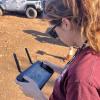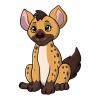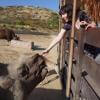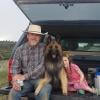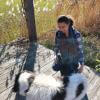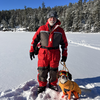In recent decades, the use of dogs in conservation work has exploded. Deployed to detect things like invasive or elusive species, scat, poachers, illegal wildlife trade products, and much more, conservation dog teams are trained to aid teams in the field. With benefits like speedier searches over large areas, proven targeted detection accuracy, and ease of transport and surveying, conservation dogs also offer possibilities for enhancing other technological methods by confirming or providing results in real-time.
Conservation dog teams now provide scat, reptile, aquatic species, whale scat, and invasive plant detection, and plenty more. This expansion of use is partly due to refined training techniques that offer a broader capability in very specialized detection roles, and partly due to more people seeing the capabilities and benefits of trained dogs.
Specifically, the utilization of dogs in conservation has experienced a considerable increase in recent years as people realize what the capability brings to the field survey arena. The benefits of dogs offering enhanced detection to support surveys includes:
- Speed of search
- Covering large areas effectively
- Proven detection capability
- Calibrated on a variety of species, if required
- Accuracy in the detection of targets and ignoring similar non-target specimens
- And easy to transport to survey sites.
Whether you train, handle, use, or are interested in finding out more about conservation dogs, this is the community for you! This group is growing, so if you'd like to get started and make connections here, here are some suggestions:
- Do you have advice to share with others who are interested in trying conservation dog work for the first time? Or do you need advice on whether conservation dogs suit your work?
- Do you have resources or research to share on training or using conservation dogs?
- Do you have a case study or project update that involves conservation dogs?
- Do you have a question about how to access conservation dogs for your own work?
Your group manager is Paul Bunker. Direct message him through WILDLABS or email him here with any questions or suggestions.
Header photo: Bill, photographed by Stephanie O'Donnell
No showcases have been added to this group yet.
- 0 Resources
- 0 Discussions
- 16 Groups
- @msgunther1
- | she, her
Micaela Szykman Gunther is a Professor in the Department of Wildlife at Cal Poly Humboldt. She applies studies on animal behavior of (mostly) carnivores and (some) ungulates to inform management of wildlife species.
- 0 Resources
- 0 Discussions
- 4 Groups
Adventure Scientists is a 501(c)3 nonprofit organization based in Bozeman, MT that equips scientists and researchers with high-quality data collected from the outdoors that are crucial to addressing environmental challenges around the world.
- 0 Resources
- 0 Discussions
- 16 Groups
Georgia Institute of Technology
Grad Student
- 0 Resources
- 2 Discussions
- 7 Groups
- @elliearmstrong
- | she/her
I am an Assistant Professor of Evolutionary Genomics at UC Riverside. I use genomic technology to advance our understand of biodiversity and support conservation science.
- 0 Resources
- 0 Discussions
- 4 Groups
- 0 Resources
- 0 Discussions
- 1 Groups
- @rosalie.tribe
- | She/her
Arm
- 0 Resources
- 0 Discussions
- 5 Groups
Queensland University of Technology (QUT)
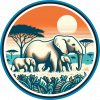


- 1 Resources
- 18 Discussions
- 6 Groups
- @EllieW
- | She/Her



- 88 Resources
- 123 Discussions
- 13 Groups
- @organicjo
- | She/her
Program Strategist for the Conservation Dogs Collective and founder of Nose No Limit
- 0 Resources
- 0 Discussions
- 2 Groups
- @jsevans
- | He, Him
Senior biometrician, with the Nature Conservancy science team, attempting to bring vigor from diverse fields such as landscape ecology, spatial statistics, remote sensing and applied mathematics to answer practical conservation questions.
- 0 Resources
- 0 Discussions
- 7 Groups
Fauna & Flora
Senior Technical Specialist, Wildlife Trade
- 0 Resources
- 9 Discussions
- 9 Groups
Scientists at Victoria's Healesville Sanctuary are using trained sniffer dogs on paddleboards to track and identify platypuses in their habitat.
23 July 2025
Murray-Darling carpet python populations in South Australia have declined due to loss of habitat and predation. Trials using conservation detection dogs to find the snakes in the Riverland have so far had positive...
26 May 2025
A published research study
15 January 2025
Their keen noses are helping researchers document the diversity of fungi living underneath Pacific Northwest forests.
15 January 2025
Published research paper
27 August 2024
WildLabs will soon launch a 'Funding and Finance' group. What would be your wish list for such a group? Would you be interested in co-managing or otherwise helping out?
5 June 2024
YouTube link to interview regarding the Saola Detection Canine project in Laos
10 December 2023
This article discusses a project utilizing canines to detect the scat of a critically endangered mammal, the Saola.
10 December 2023
A secure platform designed for those working to monitor & protect natural resources. Insight facilitates sharing experience, knowledge & tools to increase efficiency & effectiveness in conservation. By...
7 November 2023
Detection dogs may provide a non-invasive way to determine female receptivity, but this has not been explored in captive wildlife. This exploratory study investigated the use of detection dogs as a novel method of...
25 October 2023
By sniffing out egg masses, dogs are helping researchers against an invasive species
26 April 2023
Published paper attached
14 November 2022
November 2023
event
February 2023
| Description | Activity | Replies | Groups | Updated |
|---|---|---|---|---|
| https://onlinelibrary.wiley.com/doi/10.1002/aqc.3531#aqc3531-bib-0028 |
|
Conservation Dogs | 4 years 6 months ago | |
| Hello Conservation Dogs group members WildTrack (wildtrack.org) has just joined WildLabs and we have a new community forum FIT (... |
|
Conservation Dogs | 5 years 3 months ago | |
| Hi Yvan, My name is Jennifer Hartman and I work with Rogue Detection Teams, a program that works with and instructs conservation detection dog teams. Did you ever receive enough... |
|
Conservation Dogs | 5 years 7 months ago | |
| Hi Steph and all, I don't work with detector dogs directly but colleagues of mine in the Pedernales province of the Dominican Republic have used a dog to locate iguana... |
|
Conservation Dogs | 7 years 2 months ago | |
| Hi Megan That sounds great, thank you! I will message you. Best Katrin |
|
Conservation Dogs | 7 years 3 months ago | |
| The next Cambridge conservation seminar, on Wednesday 1 November, will feature Dr Sam Wasser, from the University of... |
|
Conservation Dogs | 7 years 9 months ago | |
| Thanks! |
|
Conservation Dogs | 9 years 3 months ago |

